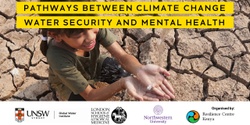Pathways between water security, climate change and mental health - 27 July, 3pm BST
Event description
Join us for an insightful webinar titled "Pathways Between Climate Change, Water Security, and Mental Health" as we explore the critical interconnectedness of these issues.
27 July 2023, 3pm BST | 27 July 2023, 4pm CEST | 28 July 2023, 12.00am AEST
Webinar link - https://us06web.zoom.us/j/88223099654
ABOUT
The purpose of this webinar is to examine links between climate change, water security and mental health, particularly in island nations. While the emotional effects of stress and anxiety around a warming climate are well known, specific evidence is lacking on the connection between climate events and impacts on mental health as a result of changes to water security. Our four panellists have expertise in social equity and water insecurity (Pablo Gaitan Rossi), climate resilience (Simon Thuo), and linkages between climate and human health (Sandeep Maharaj and Natalie Greaves).
We will discuss the urgent need to measure both acute and long-term psychological impacts, while also focusing on solutions to help communities build resilience. Gain valuable insights into developing resilient strategies and understanding the cognitive processes that influence decision-making in the face of climate crises.
SPEAKERS
- Claire Dooley - Assistant Professor, London School of Hygiene and Tropical Medicine
- Natalie Greaves - Lecturer in Public Health, University of the West Indies
- Sandeep Maharaj - Senior Lecturer in Pharmacy, University of the West Indies
- Simon Thuo - Director, Policy, Research and Institutional Development at Resilience Centre Nairobi
- Pablo Gaitán Rossi - Director, EQUIDE, Instituto de Investigaciones para el Desarrollo con Equidad, Universidad Iberoamericana
AGENDA
- Opening
- Welcome
- Purpose of the webinar
- Introductions
- Moderated discussion
- Online questions
- Final remarks and next steps
ORGANISERS
- Andrew Dansie - Senior Lecturer and Academic Lead, Humanitarian Engineering, University of New South Wales, Sydney
Dr. Andrew Dansie is a Senior Lecturer and Academic Lead at UNSW, specializing in large-scale environmental systems and international development for environmental and social SDGs. With 18 years of experience in the water and development sector, he has worked in various capacities, including the private sector, the United Nations, universities, and an NGO. Currently, he focuses on water resources, air pollution, and the biogeochemistry of dust. He leads a research program on airborne pollution and long-range dust transport in the South Pacific in collaboration with several countries. He holds a doctorate from the University of Oxford, where his research focused on nutrient-rich dust and its impact on marine environments. He is recognized as an expert in international water resources management and has prepared policy briefs for the Global Environment Facility. He has also worked on projects with the United Nations University and UNICEF/University of Oxford, contributing to water security and agricultural practices.
- Greg Leslie - Director, University of New South Wales Global Water Institute, Sydney
Professor Greg Leslie is the Director of the UNSW Global Water Institute, and the Director of the UNESCO Centre for Membrane Science and Technology. Prior to joining UNSW, he worked in the public and private sector on water treatment, reuse and desalination projects in Australia, New Zealand, Singapore, Hong Kong and the United States. His experience includes work on the NEWater recycling projects for the Singapore Public Utilities Board and the Groundwater Water Replenishment System at the Orange County Water District (OCWD) in California. He served on the World Health Organisation Technical Committee that developed guidelines for desalination, the Water Issue Committee for the Australian National Health and Medical Research Council and the Independent Advisory Panel for the Orange County Groundwater Replenishment Project.
- Simon Thuo - Director, Policy Research and Institutional Development, Resilience Centre, Nairobi
Simon has successfully established Water Resources and WASH networks in countries such as Kenya, Uganda, Rwanda, and Ethiopia. As the Regional Coordinator for GWP Eastern Africa, he facilitated sustainable water development programs in the Nile Basin and Greater Horn of Africa, supporting countries in those regions. Simon is currently engaged in South Sudan, Ethiopia, Kenya, Tanzania, DRC, Rwanda and Uganda, on catchment and wetland restoration, catalysing stakeholder involvement in conservation and management while analysing development, humanitarian and climate risk screening through water resources development and strengthening cross-border cooperation for their transboundary waters. He is also leading teams on rangeland management to address challenges facing pastoralist communities in Sahel, Sahara and other African drylands. WASH for emergencies, refugees and internally displaced people.
- Sera Young - Associate Professor, Anthropology and Global Health Studies, Northwestern University, Chicago, IL
The focus of Dr. Young’s work is on the reduction maternal and child undernutrition in low-resource settings, especially sub-Saharan Africa. Methodologically, she draws on her training in medical anthropology (MA, University of Amsterdam), international nutrition (PhD, Cornell) and HIV (Fellowship, University of California San Francisco) to take a biocultural approach to understanding how mothers in low-resource settings cope to preserve their health and that of their families. Dr Young led the team that created the Water Insecurity Index (WISE) Scales - simple survey tools that quantify how often people around the world encounter problems with the access, use, and reliability of water for domestic use.
- Claire Dooley - Assistant Professor, London School of Hygiene & Tropical Medicine, London
Dr. Claire Dooley is an Assistant Professor in the Department of Population Health at LSHTM where her work focuses on food and water security in crisis settings. Claire has expertise in geospatial analyses and developing quantitative methods for sparse data. Through her global health research, she has collaborated with UNFPA, UNICEF, IOM, REACH as well as other NGOs and government ministries. Claire has an MSc in Conservation & Biodiversity (University of Exeter) and a DPhil in Mathematical Ecology (University of Oxford).
JOIN THE ZOOM WEBINAR
Please click the link below to join the webinar:
https://us06web.zoom.us/j/88223099654

